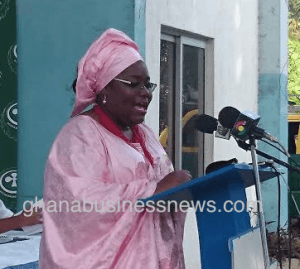Gender Ministry merits more funds – MP

Mrs Gifty Eugenia Kusi, New Patriotic Party (NPP) Member of Parliament for Tarkwa-Nsuaem, has called on government and development partners to provide more funding to the Ministry of Gender, Children and Social Protection.
She said budgetary allocation to the Gender Ministry was woefully inadequate judging its expanded mandate to ensure gender equality, promote the welfare and protection of children, and to empower the vulnerable, excluded, the aged and persons with disabilities, for sustainable national development.
Mrs Kusi stated at the side event of Ghana at the on-going 60th session of the United Nations Commission on the Status of Women.
The side event was on the theme: “Sexual and Gender-based Violence in Ghana; Response, Prevention and Elimination,” was organised by the Gender Ministry in collaboration with Ghana’s Permanent Mission to UN at New York.
The Gender Ministry was re-designated by Executive Instrument in 2013, which has resulted in a merger of the then Ministry of Women and Children’s Affairs (MOWAC) with the Department of Social Welfare (DSW), National Council on Persons with Disability (NCPD) and the Social Protection Division of the Ministry of Employment and Social Welfare (MESW).
Mrs Kusi who was contributing to the discussion noted that issues of gender-based violence; forced, early or child marriage; FGM, witches camp, gender-based discrimination and other issues were core to societal development.
“The gender ministry therefore needs more money to be able to enhance institutional arrangement for inter- and intra-sectoral collaboration; promote gender equity in political, social and economic development systems and outcomes; and safeguard the security, safety and protection of the rights of the vulnerable in society, especially the girl child and women.
“As well as promote effective child development in all communities, especially deprived areas; protect children against violence, abuse and exploitation; ensure a more effective appreciation of and inclusion of disability issues in national discourse; and mainstream issues on ageing in the development planning process,” she said.
Speaking on: “Domestic Violence in Ghana: Incidence, Attitudes, Determinants and Consequences,” Professor Patricia Justino, Institute of Development Studies, United Kingdom, said there was strong correlation between exposure to domestic violence and mental health, particularly among women.
She said “Women who experienced psychological, physical and economic violence had higher risk of suffering from severe mental illness between 50-100 per cent more likely than women that did not experience violence”.
Prof Justino noted that other adverse consequences of sexual and gender-based violence on daily life were ability to work, poor concentration and reduce levels of confidence.
It also has adverse qualitative effects on child development, educational opportunities among children and on youth deviant behaviour.
Presenting an overview of sexual and gender-based violence and government’s intervention, Nana Oye Lithur, Minister of Gender, Children and Social Protection, noted thatGhana adopted the UN definition of Gender Based Violence (GBV) as per the UN Declaration on the Elimination of Violence Against Women.
Ghana has also adopted a programmatic approach to ending Sexual and Gender Based violence (SGBV) since 1997, and in 1998, the first ever specialised Ghana Police Service Unit called the Women and Juvenile Unit (WAJU) was established.
A comprehensive legal and policy framework exist to address SGBV in Ghana – the 1992 Constitution, the Criminal Offences Act (1960), the Criminal Code Act (1960), Juvenile Justice Act, Human Trafficking Act (2005), and the Domestic Violence Act 732 (2007).
Nana Oye Lithur who is a human rights advocate, explained that the Domestic Violence Act provides integrated support to victims and regulations have been developed for effective implementation.
She said the National Gender Policy provides broad policy guidelines, strategies and operations to further achieve gender equality and women’s empowerment.
The Intestate Succession and Property Rights of Spouses Bill to ensure women and children inherited from the estate of their deceased spouses who die intestate.
The Affirmative Action Bill seeks to promote the full and active participation of women in public life, and pegged minimum representation of women at 40 per cent.
The Child and Family Welfare Policy was developed to ensure that children grew up in homes and communities that were free from violence and abuse.
The Human Trafficking Act and Regulations law for the prevention, reduction, and punishment of human trafficking, for the rehabilitation and reintegration of trafficked persons.
Nana Oye Lithur said the mandate of WAJU was expanded and change to the Domestic Violence Victim Support Unit (DOVVSU) of the Ghana Police Service.
She said DOVVSU reports indicate that 15,426 SGBV cases was recorded in 2014 – 4,415 assault cases on women; 342 rape cases; and 1,296 defilement cases.
Between 2009 and 2013; 84, 142 cases were reported nationwide – 20,693 assault on women; 1,689 rape cases; and 5,697 defilement.
Representatives of Member States, UN entities, and the United Nations Economic and Social Council (ECOSOC) accredited non-governmental organisations from all regions of the world are attending CSW60 session.
The priority theme for CSW60: “Women’s Empowerment and Its Link to Sustainable Development”.
The CSW was established in June 1946 as a mechanism to promote, report on and monitor issues relating to the political, economic, civil, social and educational rights of women.
It holds annual sessions in March to evaluate progress made in protecting and enforcing the rights of women globally.
Source: GNA
